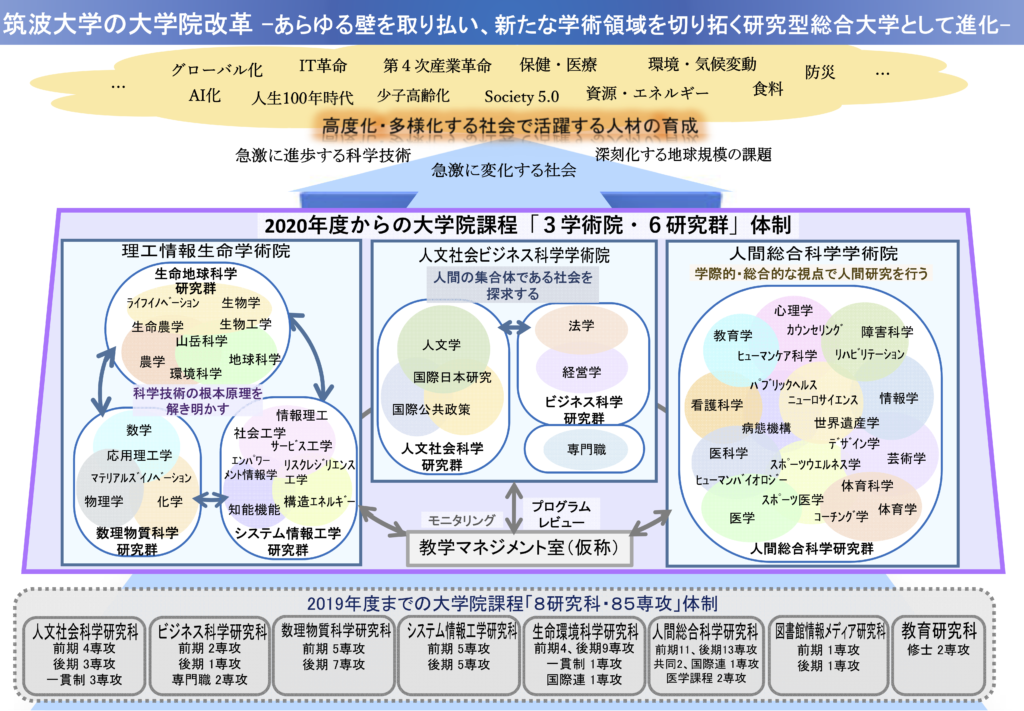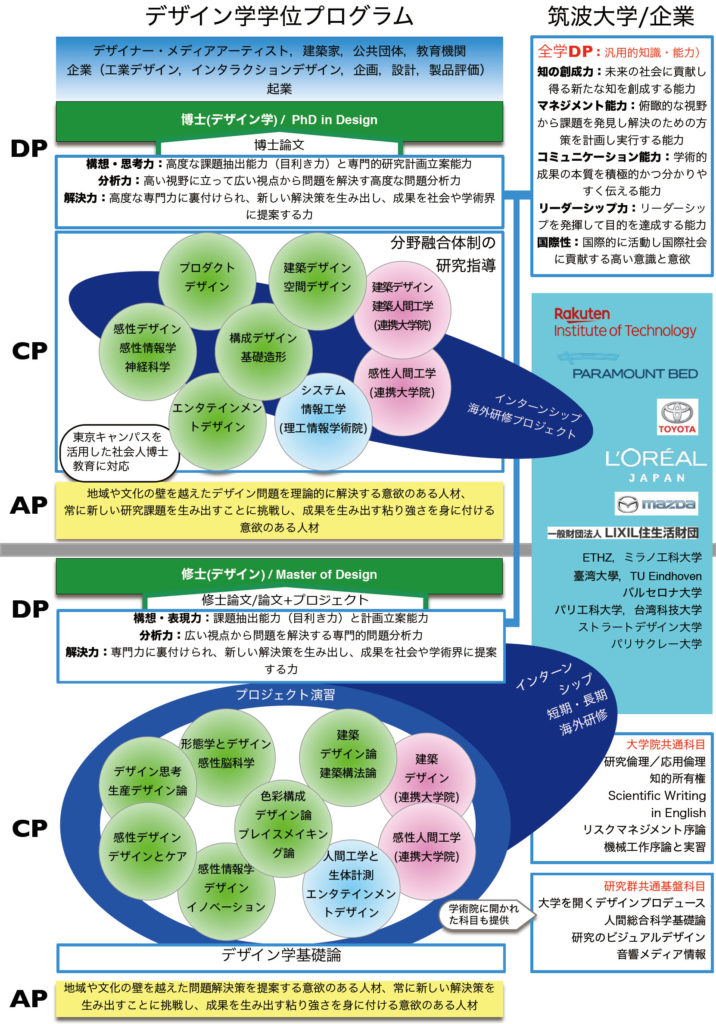A New Degree Program Resulted from the Graduate School Reform
From 2020, the University of Tsukuba will reorganize the doctoral school to degree program system, and the Master’s and Doctoral Program in Design. The degree program allows the university to exercise mobility at its discretion and actively engage in cross-departmental education using internal resources. The degree programs are transcends the research discipline and professors can teach at up to four degree programs. This system will support transcends the organizational framework and multi disciplinal education in graduate school. We aim to develop educational methodology and provide learning opportunities from the perspective of the students through the three policies – diploma policy, curriculum policy, and admission policy and constructing the educational organization necessary for the procedure with a cross-integration of discipline.
3 New Schools with 6 Research Group
The University of Tsukuba will be reorganized into three graduate schools and six degree programs. The school is a comprehensive organization that includes related fields, and the degree programs are bundled in the research objectives. The school is a core organization that is responsible for the implementation of the three policies. The staffs belong to a faculty organization, but they can involve in multiple degree programs and provide research and education for the various degree programs.
Learning Outcomes through Competency of General Skills x Professional Skills and Clarification of Learning Objectives
The knowledge and abilities that students should acquire at the at the point of graduation are determined by competencies achieved in general skills based on generic competences, and specific competences at the degree programs. Students can acquire generic and specific competences through the subjects offered by the degree programs or any subjects in the school’s fundamental common subjects and common subjects.
 Organizational diagram for a new graduate program
Organizational diagram for a new graduate program
Design Degree Curriculum and Policies
The Master’s and Doctoral degree program in Design are research based but practical and interdisciplinary course with a variety of related fields, including Design, Affective Engineering, Medical and Medicine Sciences, Systems and Information Engineering, and Disability Sciences. Students will develop the ability to identify problems, to plan from a broad perspective, complete tasks, persuade logically, communicate international and develop the proposal. These abilities are necessary for the practice of various designs such as Products and Planning, Entertainment, Architecture, and Environment.
Master’s Diploma Policy (Graduation Accreditation)
【General knowledge and ability】
1.Ability to use knowledge: able to use advanced knowledge in society
2.Communication ability: able to convey expert knowledge accurately and clearly
3.Management ability: able to respond accurately to issues from a broad perspective
4.Group skill: able to collaborate as a team and actively contribute to the achievement of goals
5.International character: have the awareness to contribute to the international community
【Specialized knowledge and ability】
6.Conceptual and expressive ability: able to identify problem identification (conscientiousness) and plan
7.Analytical ability: able to analyze problems and solve problems from a broad perspective
8.Problem-solving ability: able to propose and create new solutions backed by the expertise to society and the academic community
Doctoral Diploma Policy (Graduation Accreditation)
【General knowledge and ability】
1.Ability to create knowledge: able to create new knowledge that can contribute to the future society
2.Communication ability: able to convey the essence of academic results positively and clearly
3.Management ability: able to discover issues from a bird’s eye view, plan and execute solutions
4.Leadership ability: Leadership skills: Able to demonstrate leadership and achieve objectives
5.International character: Have high awareness and willingness to work on international activities and contribute to the international community
【Specialized knowledge and ability】
6.Conceptualization ability: able to identify problem identification (Consciousness) and plan research at the advanced level
7.Analytical ability: able to analyze and solve problems with broad perspective at the advanced level.
8.Problem-solving ability: able to propose and create new solutions to society and academia, supported by an advanced level of expertise

Organizational structure of the Graduate Program in Design
From April 1, 2020 and on, the University of Tsukuba Graduate Course of Comprehensive Human Sciences will be changed to the University of Tsukuba Graduate School of Comprehensive Human Sciences.
[Site for reference]
Master’s program https://www.geijutsu.tsukuba.ac.jp/mdes/
Doctoral program https://www.geijutsu.tsukuba.ac.jp/ddes/
2020.3.31

 Return to List
Return to List